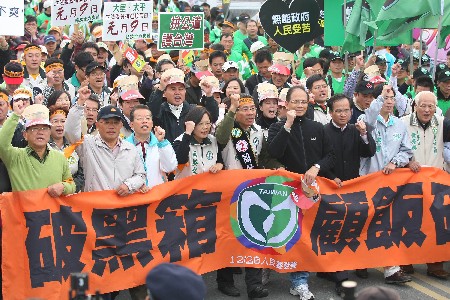China negotiator: Taiwan trade pact "long process"
Associated Press | 23 December 2009
China negotiator: Taiwan trade pact "long process"

By ANNIE HUANG
TAICHUNG, Taiwan — China’s top Taiwan negotiator said Wednesday a proposed free-trade pact that has engendered fierce condemnation from Taiwan’s pro-independence opposition will be a "long process" that can benefit both sides.
The comments from Chen Yunlin appeared to be aimed at assuaging opposition concerns that the pact could undermine Taiwanese sovereignty and lead to significant job losses on the island of 23 million people.
Chen was speaking in the central Taiwanese city of Taichung on the third day of his scheduled five-day visit.
The pact — formally known as the Economic Cooperation Framework Agreement or ECFA — is the centerpiece of President Ma Ying-jeou’s signature effort to link Taiwan’s economy ever closer to China’s lucrative markets. He says he hopes it will be signed in the spring of 2010.
Since taking office in May 2008, the Harvard-educated Ma has eased tensions across the 100-mile-wide (160-kilometer-wide) Taiwan Strait to their lowest level in 60 years, turning his back on predecessor Chen Shui-Bian’s pro-independence policies. The sides split amid civil war in 1949, and Beijing has made political unification with the island - achieved by force if necessary - the core of its Taiwan policy ever since.
Speaking to a business group in Taichung, Chen emphasized the positive aspects of the proposed ECFA deal.
"We can complement each other, we can grow together," he said. "The framework agreement is going to be a long process."
Little is known about the deal except that it would reduce restrictions on trade between the two sides, save for some Chinese agricultural and labor exports. If signed, it is expected to be implemented gradually, with textiles, machinery and petrochemicals likely to be early beneficiaries of bilateral tariff reductions.
In an interview with The Associated Press on Tuesday, Chairwoman Tsai Ing-wen of the main opposition Democratic Progressive ( PGR - news - people ) Party blasted Ma over the deal, charging he was negotiating with China in a way that flouts "democratic rules."
"The people here did not give the president a blank check," Tsai said. "He has to conduct business according to democratic rules here. Rule number one is of course transparency."
Tsai says that ECFA will cost Taiwanese jobs and undermine Taiwan’s de facto independence - charges Ma denies.
In his first 18 months in office, Ma has pushed a raft of business-boosting initiatives with China, including the resumption of regular air and sea links after a hiatus of 60 years and the ending of across-the-board restrictions on Chinese investment in Taiwan.
Ma argues that a trade deal with China is necessary to prevent Taiwan’s economic marginalization amid growing commercial ties between Beijing and neighboring Asian countries.
Washington strongly supports Ma’s approach. Despite withdrawing its formal diplomatic recognition of China from the Taipei government and shifting it to Beijing in 1979, it remains the most important foreign partner of democratic Taiwan. However, it fears being drawn into any armed conflict that Beijing threatens in response to moves to formalize Taiwan’s de facto independence, and it sees Ma’s policies as strongly reducing that possibility.





